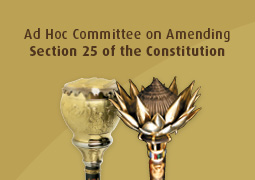
Parliament, Wednesday, 31 March 2021 – The Ad Hoc Committee to Initiate and Introduce Legislation Amending Section 25 of the Constitution today received a briefing from Parliament Legal Services on legal matters arising from the oral submissions made during recent public hearings on the expropriation of land without compensation.
Committee Chairperson, Dr Mathole Motshekga, reminded Members of the committee that it was now up to them to caucus with respective political parties on these matters as to the way forward. The committee also received a briefing from the Department of Agriculture, Land Reform and Rural Development (DALRRD).
Parliament Legal Services indicated that it did not believe that the 18th Constitutional Amendment Bill is against the basic structure of the Constitution, which would make it unconstitutional as suggested by some. The committee heard that the Expropriation Bill, currently before the Portfolio Committee on Public Works, in any event has an open list, so there is no limitation. The reason for this amendment is to give legal certainty on something that has been criticised as allowing for legal uncertainty. It stated that the Constitution has many enabling clauses that lead to the promulgation of national legislation that fills in where the Constitution gives a framework.
Regarding assertions in the public hearings that the amendments would “undermine democracy itself” or will “destroy the Constitution”, the committee heard that Parliament Legal Services further stated that this is not a limitation of rights, the current wording is implicit currently, it upholds the rule of law and it has a rational purpose.
The committee heard that the the Bill makes explicit that which is already implied in the current reading of Section 25 (8) of the Constitution. The Bill also has a rational purpose and the wording of the Bill is linked to that rational purpose.
Regarding concerns about the improvements made on land to be expropriated, the committee heard that originally land (and improvements to the land) was not explicitly part of the resolution. It was developed after the workshop held by the committee. Parliament Legal Services recommended that “improvements” be removed from the Bill. It said land will not be arbitrarily deprived as the criteria will still be applicable and therefore the improvements to the land will be factored in.
Regarding concern regarding the wording about the role of the courts on the matter of compensation, the amount and the time and manner of payment, of which have either been agreed to by those affected or decided or approved by a court, it was recommended that a court should not be the only party to decide on the amount of compensation being nil as this will result in administrative burden and delays. The Minister is in practice not the only role player in making decisions. The executive has a role to play in offering and negotiating for nil Rand and only where no agreement can be reached, should the courts step in.
DALRRD said making it implicit would assist the department as it will clarify the issue of compensation. It listed the following challenges the state has encountered in land reform in general – the application of the Expropriation Act, 1975, is premised upon market value compensation, compensation provisions in the 1975 Expropriation Act are not aligned with Section 25 of the Constitution, there is no developed jurisprudence on the meaning of just and equitable compensation, the weighting of the factors in Section 25 (3) remains a challenge and that the current expropriation process is cumbersome and costly and at the mercy of land owners.
ISSUED BY THE PARLIAMENTARY COMMUNICATION SERVICES ON BEHALF OF THE CHAIRPERSON OF THE AD HOC COMMITTEE TO INITIATE AND INTRODUCE LEGISLATION AMENDING SECTION 25 OF THE CONSTITUTION, DR MATHOLE MOTSHEKGA.
For media enquiries or interviews, please contact the committee’s Media Officer:
Name: Rajaa Azzakani (Ms)
Tel: 021 403 8437
Cell: 081 703 9542
E-mail: razzakani@parliament.gov.za

